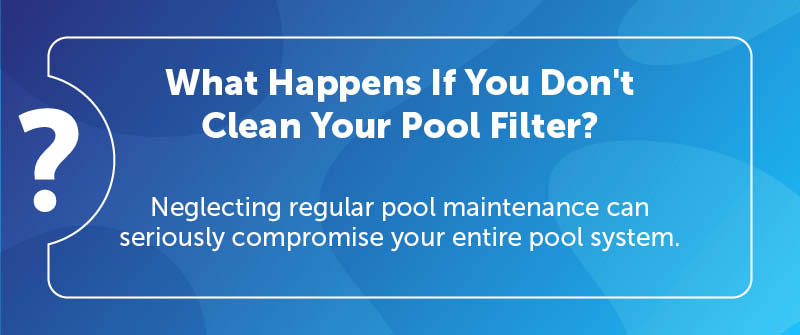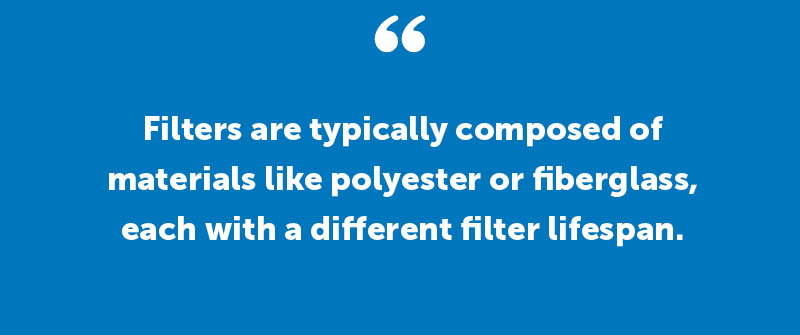How Do I Know When My Pool Filter Needs Cleaning?
Knowing the appropriate cleaning frequency and how often you should clean your Pentair pool filter (or other filter brands) is crucial for maintaining optimal pool health and performance. Keeping an eye on a few key signs can indicate when it’s time for a cleaning of you pool’s filter cartridge.
Signs To Look For In A Clogged Pool Filter
A key indicator that your pool filter needs cleaning is the reduction in water flow. If you notice that water isn’t circulating as robustly as usual, it’s a sign that filter cleaning might be necessary. Higher than normal filter pressure, specifically 8 PSI or more above the optimal reading, suggests that the filter is clogged and requires cleaning. A clogged filter collects debris that hinders water movement through the system.
Observing Pool Filter Pressure Gauge Readings
Another critical method to determine if your pool cartridge filter is bad and needs cleaning is checking the pressure gauge. Each pool filter has a recommended maximum pressure, and exceeding this can signal that the filter needs attention. Regularly monitor these filter gauge pressure readings, as an unusual increase can mean the filter is clogged with debris and dirt, leading to reduced efficiency.
Water Quality Indicators
Lastly, poor water quality in your swimming pool is often a telltale sign. If your pool water appears cloudy, even after treatment, or if you’re experiencing frequent algae outbreaks, it’s time to consider cleaning your filter. These issues often stem from inefficient filtration when the filter is too dirty to capture particles and debris effectively.
By staying vigilant and understanding these signs, as a pool owner, you can ensure that your pool remains in pristine condition, providing a safe and clean swimming environment for you and your family. Regular maintenance not only prolongs the life expectancy of a pool filter but also enhances your pool’s overall functionality.
What Happens If You Don’t Clean Your Pool Filter?
Neglecting regular pool maintenance, particularly the upkeep of your pool’s filter, can seriously compromise your entire pool system. A dirty filter fails to effectively clean the water, causing a cascade of issues that can affect both the swimming experience and the longevity of your pool.

Impact On Water Circulation
A clogged filter inhibits the proper circulation of water, making regular cleaning essential. When water can’t flow freely, it puts extra strain on your pump, which can lead to overheating. Reduced circulation also means that the water is not being adequately filtered, leading to dirt and debris buildup.
Chemical Imbalances Leading To Algae Formation
With a dirty filter, the distribution of chemicals throughout the pool is uneven, which can result in chemical imbalances. Using a filter cleaner specifically designed for pool maintenance can help prevent this issue. This imbalance often creates the perfect breeding ground for algae, transforming your crystal-clear pool into a green, slimy mess.
Potential Damage To Pool Equipment
Failure to regularly clean filter cartridges can result in increased pressure within the filtration system. This heightened pressure can damage not only the filter itself but also other components like the pump and pipes, leading to costly repairs or replacements.
How Often Should I Rinse My Pool Filter? Understanding Cleaning Frequency
Maintaining a clean pool filter is essential to ensure the longevity and efficiency of your pool’s filtration system. How often does a pool filter need to be cleaned? Understanding the appropriate cleaning frequency is crucial, as the frequency at which you rinse your pool filter largely depends on the type of pool you own and the specific filtration system in place.
Regular Pool Maintenance Schedule For Different Pool Types
For a diatomaceous earth filter, which is known for its fine filtration, it is generally recommended to backwash the filter once a month and perform a thorough cleaning at least once every season. This regular maintenance helps in removing debris and trapped particles, ensuring optimal performance.
For above-ground pool filters, which may have different types such as sand filters or cartridge filters, the cleaning schedule can vary. Sand filters typically need backwashing once every two weeks, while cartridge filters should be rinsed once a month, and deeply cleaned once or twice a year.
Influences Of Pool Usage And Environmental Factors
If your pool experiences heavy usage or is situated in an area with lots of debris, such as leaves from nearby trees, more frequent rinsing may be necessary. In these cases, it’s wise to visually inspect your filters more regularly and adjust your cleaning schedule accordingly.
Guidelines For Different Filtration Systems
Other factors such as weather conditions, number of swimmers, and pool size also play a significant role in determining a Pentair filter cartridge maintenance schedule. A handy tip is to regularly monitor the pressure gauge – if it’s reading 8-10 psi higher than the clean, baseline level, it’s time for a rinse. Following these guidelines helps in maintaining crystal clear water and efficient pool operation.
How Many Times Can A Pool Filter Be Cleaned?
Maintaining your cartridge filter is essential to ensuring a clean and safe swimming environment. However, understanding the limits of how often a filter can be effectively cleaned before it needs to be replaced is important for optimal performance.
Understanding Filter Material Durability
A key factor in determining the lifespan of a pool filter, including a sand filter, is the material from which it is made. Filters are typically composed of materials like polyester or fiberglass, each with a different filter lifespan. Regular wear and tear from cleaning and natural usage gradually diminish the filter’s effectiveness. If you notice the filter material thinning or tearing, it is a clear sign that it’s time for a replacement.

Manufacturer Recommendations
Many pool filter manufacturers provide guidelines on how often their filter cartridges can be cleaned before their efficiency starts to decline. These recommendations can range from several cleans to a few years of use depending on the type of filter and the upkeep practices. Following these manufacturer recommendations closely will help in extending the life of your filter and ensure that you do not replace it prematurely.
Indicators For Filter Replacement
Besides obvious damage to the filter material, other signs can also indicate that your pool filter may need to be replaced. Persistent cloudiness in your pool water, reduced water flow, higher than normal filter pressure (specifically 8 PSI or more above the optimal reading), and an inability to maintain proper water chemistry can point to a filter no longer performing as needed. Paying close attention to these indicators helps prevent the inefficiencies that come with an overused filter.
In summary, while cleaning extends a filter’s use, there comes a point where replacement is necessary to maintain water quality and safety. Monitor your filters, adhere to cleaning limits, and replace them when they no longer serve effectively.
Enjoy clear and safe pool experiences with high-quality filters from DiscountFilters.com. Explore our wide selection of reliable and affordable pool filters to keep your swimming environment pristine. Choose from our easy-to-install options for a worry-free filtering solution.

